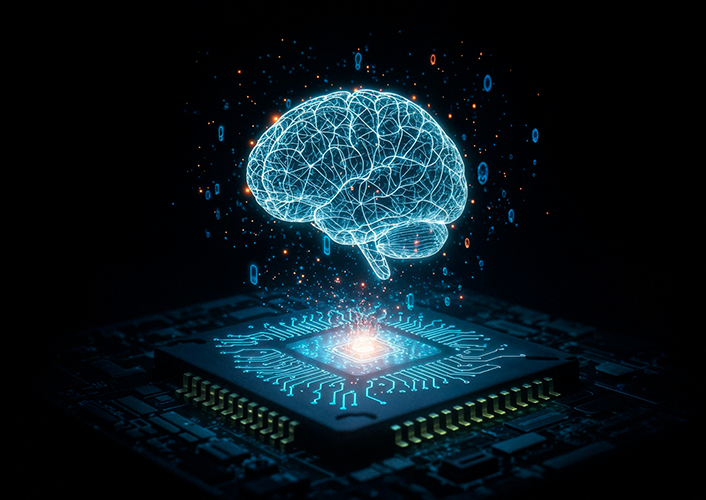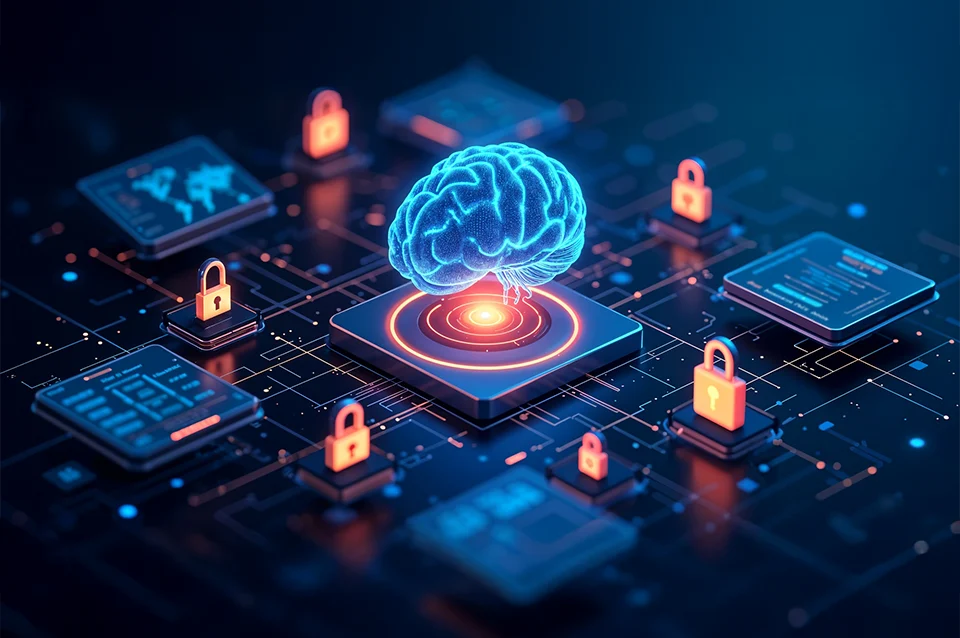In modern industries, the transition to AI-enabled machine learning services has already begun, as these solutions enhance operational workflows and create new levels of process efficiencies.
Machine learning services have become critical software applications for businesses in every industry to forecast manufacturing mistakes, as well as to personalize healthcare solutions, in order to remain competitive in national and global marketplaces.
Chief Technology Officers (CTOs) and Chief Information Officers (CIOs), as well as data scientists and AI researchers, need to be fully aware of these advances to leverage artificial intelligence appropriately to pursue business development and create innovation.
In this article, we explore machine learning applications in different industries, along with the benefits and examples driven by use cases. We also go over the prospects of machine learning in predictive analytics, as well as other related topics such as healthcare machine learning and ML applications in financial risk management and cyber security.
Introduction to ML Services
Machine learning services use automated algorithms complemented by analytic data methods for decision-making, identifying patterns, and predicting outcomes in various fields with minimal human intervention.
Machine Learning systems differ from traditional software, because these ML systems learn to provide more accurate insights as they are fed with more data sets. Companies that adopt Machine Learning achieve substantial efficiency increases, cost gains, and innovation capabilities that set their pace as leaders in the AI-based economy.
Key Machine Learning Applications in Industries
Today’s machine learning applications can be grouped into three basic groups: Business AI, Predictive Analytics, and Program-Specific Innovations.
1. ML for Healthcare Industry
Healthcare performs ML-powered applications that assure highly accurate diagnostic results and provide personalized treatment plans. The healthcare industry also experiences a new era led by advanced ML capabilities that perform better diagnostics and discover drugs and disease prevention.
Key examples include:
Identification of breast cancer is achieved more effectively utilizing Google ML systems within mammograms rather than with human radiologists.
Identification of breast cancer is more effectively achieved utilizing Google ML systems within mammograms than with human radiologists.
IBM Watson employs patient historical data to identify heart disease risk factors, whose indicators have not yet manifested while evaluating diabetes probability.
The company Insilico Medicine applies the technology of machine learning services to condense the traditional drug development procedure from decades to mere months.
Technologies in predictive analytics allow for proactive health care while reducing health care costs and saving lives, due to early detection which is bolstering health care innovation.
2. ML for Financial Risk Management: Fraud Detection & Market Prediction
Financial institutions utilize the machine learning approach to identify fraudulent actions and forecast market predictions.
Financial establishments along with the banking sector adopt ML techniques to mitigate risks, while maximizing their investments.
Using real-time transaction analysis, the ML algorithms identify indicators of fraud, which aid in spotting suspicious fraudulent actions.
A multinational bank significantly reduced its financial losses through the use of ML-centered detection systems.
ML-centered detection systems have helped a multinational bank significantly reduce its financial losses.
Market predictions operate through ML functioning to assist hedge funds in predicting market variations in order to maximize profits.
ML-powered market predictions assist hedge funds in predicting market variations in order to maximize profits.
The combination of AI-based business tools enhances the reliability of the system and boosts customer confidence while generating revenue outcomes, reiterating the necessity of machine learning services in safeguarding global financial systems.
3. ML in Cybersecurity: Real-Time Threat Detection
ML assumes an essential role in the protection of cyber security but appears to receive a mere footnote in the initial publication.
AI systems are using network surveillance to detect security breaches by way of their response rates that are faster when compared to previous detection steps.
Today’s cyber threats insist on preventive measures, which are recognized by ML systems through their ability to spot new patterns of attack.
4. Manufacturing: Smart Automation & Quality Control
Minimizing production inefficiencies through ML-driven systems:
- Visual inspection tools powered by AI help detect defects and avoid factory recalls.
- The introduction of collaborative robots (cobots) frees employees to focus on creative tasks by handling repetitive actions independently.
- Mass customization, meaning ML facilitates affordable customization, for example, personalized automobile interiors or shoes.
5. Retail: Hyper-Personalization & Logistics
Forecast trends derived from the application of ML tech can improve retail processes:
- Predictive models implemented by algorithms allow businesses to efficiently stock their products to minimize waste.
- The ML-driven automatic robot system at Amazon retrieves items quickly and enables faster order fulfillment.
6. Energy & Utilities: Sustainable Efficiency
Utilities achieve maximum grid energy efficiency through machine learning services and applications, while effectively integrating renewable energy sources.
Machine learning models predict consumer demand trends, enabling utilities to take preventive measures for managing their grids.
Using ML in operational software for renewable energies helps with solar plant output forecast, while managing grid storage needs.
Operational software that uses machine learning services to forecast solar plant output and integrates renewable energies while managing grid storage needs.
Benefits of ML Adoption
- Predictive maintenance reduces operational interruptions; fraud detection saves millions.
- Improved Precision: Machine learning reduces human errors in diagnostics and quality assessments.
- Flexibility: Applications such as customized shopping experiences or automated supply chain practices meet ever-increasing business demands.
- Green Practices: Intelligent energy optimization and waste reduction bolster sustainability strategies.


Case Studies: ML in Action
Healthcare Sector: Fraud Detection in Medical Insurance Claims. A research team based in Saudi Arabia implemented a random forest classifier that provides a classification accuracy level of 98.21% to detect fraudulent health care insurance claims.
Fraud Deterrence: Real-Time Transaction Surveillance, Combined AI-Based System of Fraud Detection in FinSecure Bank, adopted supervised and unsupervised learning techniques which help decrease fraudulent transactions efficiently by 60%.
Logistics optimization: Route and Fuel Utilization. DHL employs machine learning algorithms to analyze past data, identifying future demand shaping trends and patterns.
Energy Saving Through Grid Management: The Italian energy operator “Eni” applies machine learning techniques to increase the cost savings by improving the performance levels of the oil and gas installations.
Machine learning future trends
1. Pragmatic AI Adoption: Businesses transition from hype-fueled hype cycles to clear outputs such as ROI and efficiency as generative AI use stabilizes.
2. Beyond Chatbots: Generative AI progresses into multimodal capabilities (audio, video, robotics), as well as integrated apps, reducing the focus on a text-centric approach.
3. Agentic AI: AI agents start to take hold for automating workflows, as long as the ethical risks of hallucinations and other unexpected effects are well managed.
4. Commoditized Models: Foundation models become commodities, and the race moves to usability, pricing or ease of use/exploitation of the model outside of a specific data ecosystem or a given business problem.
5. Domain-Specific AI: Narrow and industry-specific models replace generic LLMs, with greater focus on their overall suitability (accuracy and ethical concerns) for high-impact use cases.
6. AI Literacy: Companies are starting to invest in the training of their workforce to deal with the limitations of the AI tools that they use, thus bridging the formal/bottom-up policies and informal/peer-to-peer usage premises.
7. Regulatory Fragmentation: The EU’s sweeping AI Act contrasts with an overall light-touch regulatory approach in the U.S., creating compliance hurdles for global businesses.
8. AI-Driven Threats: Deepfakes, adversarial attacks, and AI-enhanced phishing are on the rise, pushing businesses to weave AI-driven security into their core strategies.
Ready to Optimize Your Operations?
You can easily read more about the potential of machine learning services or get a free consultation with our AI experts at Netgene to customize solutions for your industry.
Netgene is your trusted partner for ML applications, so prepare for the next steps in advancing your business development.
Contact us if you have any questions.




